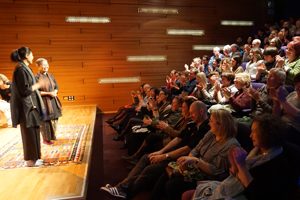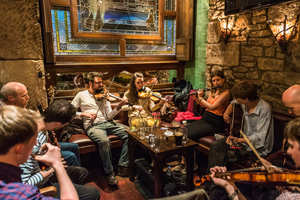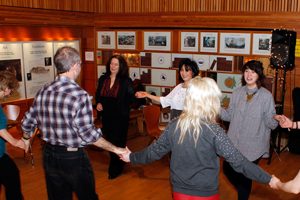Tim Porteus: Storytelling for Kids and their Dads

“If you want ideas on how to narrow the attainment gap then I think politicians are forgetting to ask the most important people. John Swinney should go and speak to those support teachers. More importantly still, he should talk to these young authors and ask, “how did you achieve this and why did you want to do it?”
Tim Porteus lives in Prestonpans, East Lothian. He mixes his storytelling with community development and has a passion for bringing the magical transformative effect of storytelling to marginalised groups.
Over the past few months, Tim has been working with the local community to pilot a Dads Inclusion Project for the Year of the Dad run by Fathers Network Scotland, funded by the Scottish Government and delivered by Midlothian Sure Start. This included the Dads’ Adventure Play Club, which met in the school once a month for the last five months.
A raft of research shows that the active involvement of dads in the school life and education of their children has a positive effect on their learning outcomes, well-being, self-esteem and success in life.
Following a very successful Dad’s Festival of Talent – an innovative conference and an exciting family day involving the community at Lawfield Primary School last weekend, Tim brought pupils in to the city centre to visit the Scottish Storytelling Centre. Here they were engaged in storytelling workshops with Tim, James Spence, Jane Mather and Janis Mackay. They then took to the stage to perform the stories they had been working on in school, accompanied by musician and singer Ross Hamilton from Port Seton. The pupils loved the experience so much that they will all be back at the centre on Tuesday 28th June for more! Tim tells below why the project is important to him, the kids and the Dads involved.
“Some things are felt rather than seen. I was on stage at The Storytelling Centre with a young person reading her story called ‘The Vampire’ who wanted to see the sunrise. She was dressed as the vampire and her story was about chasing your dreams and making them happen. I read the tale as the young vampire acted out her story. But I also had half an eye on one of her classmates who was sitting in the front row with the other young performers.
She had also written a story. It was about a dog and her puppies and a dad is a central character in the tale. She wanted her dad to be there to hear the story and act the part of the dad. We knew her dad was on his way, he was working but had told me he would find a way to be there, as he didn’t want to let his daughter down.
I knew when he’d arrived, because his daughter’s face lit up. So now it was her turn. Her dad was at the back of the theatre, but she went and fetched him by the hand. I gave him a copy of the story and he was now unexpectedly on the stage and in the spotlight.
I can only say how important a moment this was for both dad and daughter. He acted out his daughter’s story really well. It’s a tale about love, loss, trust and forgiveness. In the story the dad is the person who keeps the girl safe.
She also asked her friend, still dressed as a vampire, to help with the other character.
Both these p4 children have challenges with literacy, but they engaged wonderfully in a storytelling project I delivered at their school, Lawfield Primary. They approached me to say they’d like to write their own story, and so they both got a little extra learning support. The teachers who worked with them over a period of months were able to use the children’s own imagination to develop literacy skills and finally create their written story. This storytelling project waspart of a dads’ inclusion project, and so the dads had a role in working with their children as well.
After their performances I handed them their stories and said, “Well Done, You’re an Author Now”. And indeed they are. And more is coming.
If you want ideas on how to narrow the attainment gap then I think politicians are forgetting to ask the most important people. John Swinney should go and speak to those support teachers. More importantly still, he should talk to these young authors and ask, “how did you achieve this and why did you want to do it?”
Tim will have an article with more information about his work with Year of the Dad in the next issue of the Children in Scotland Magazine.








